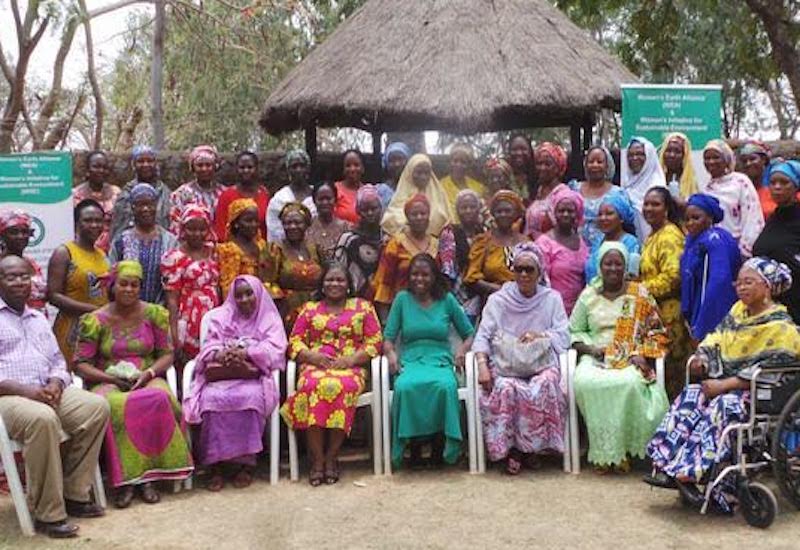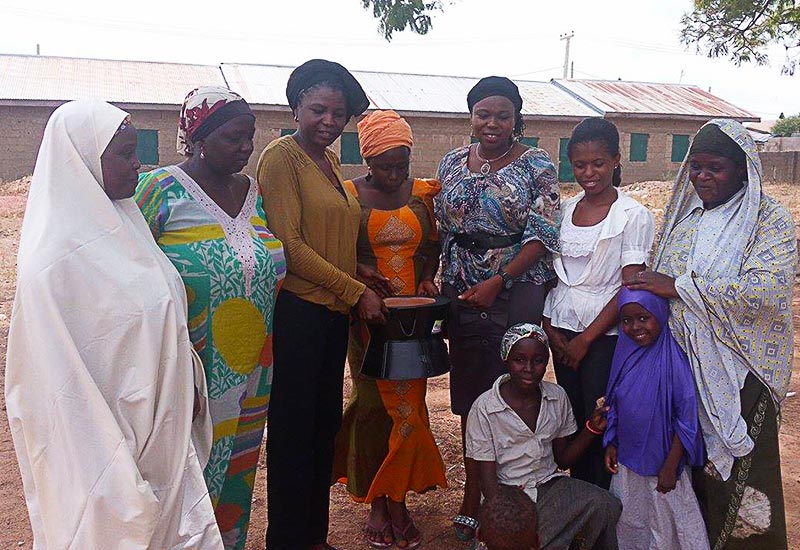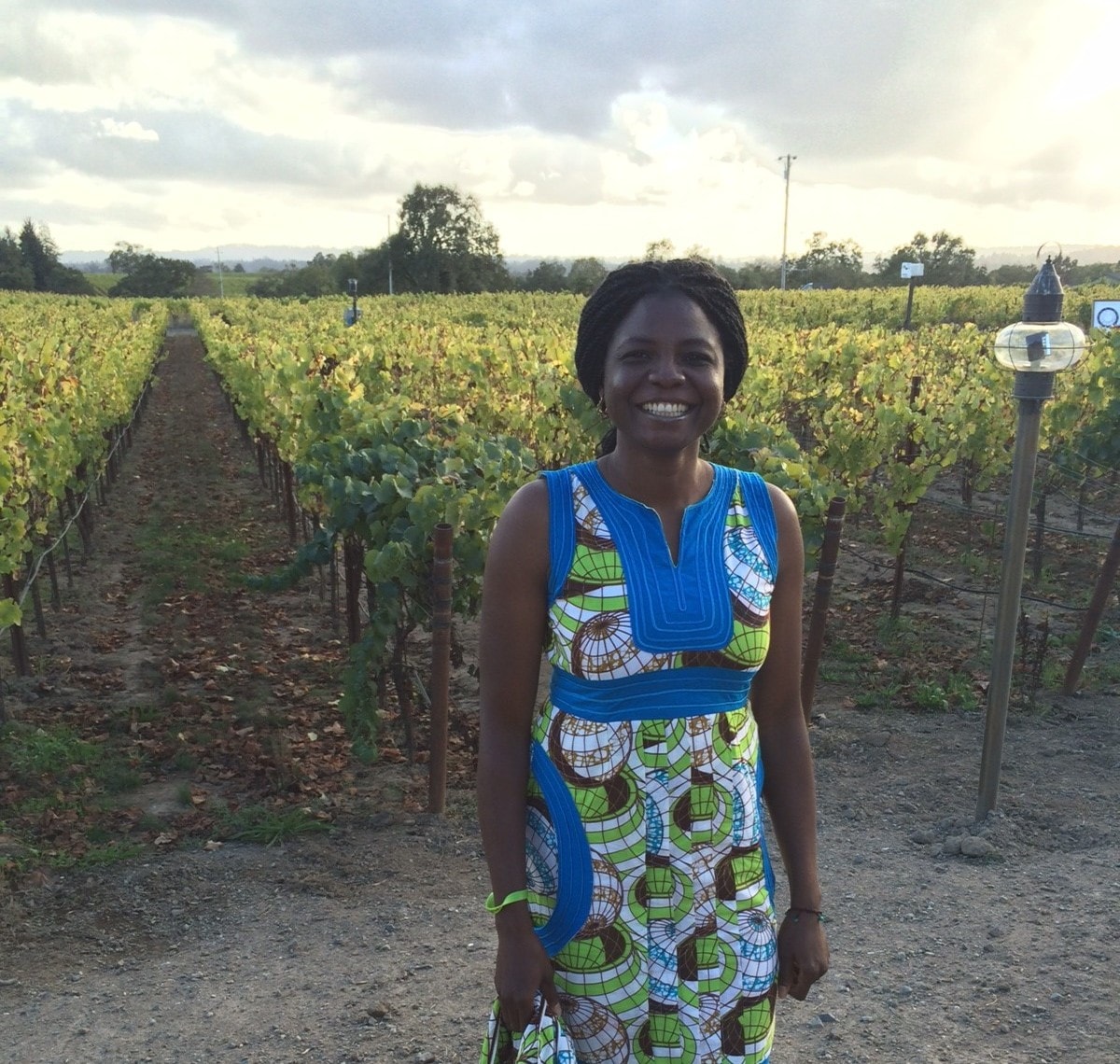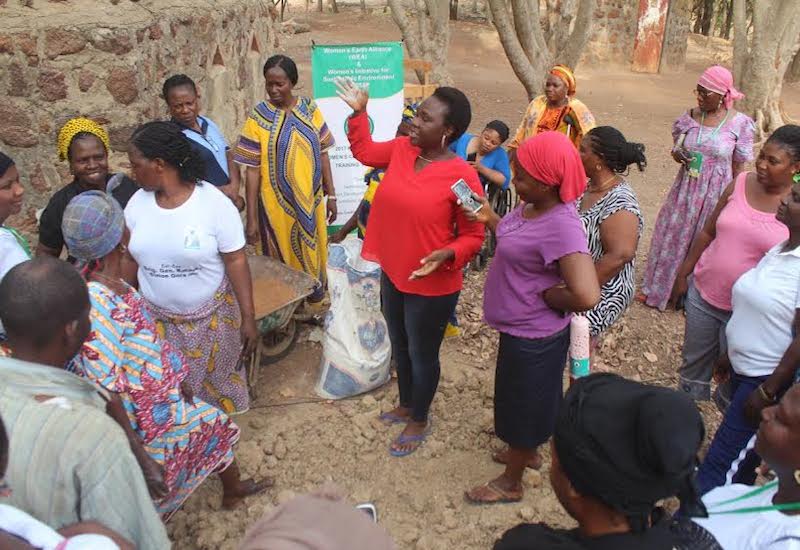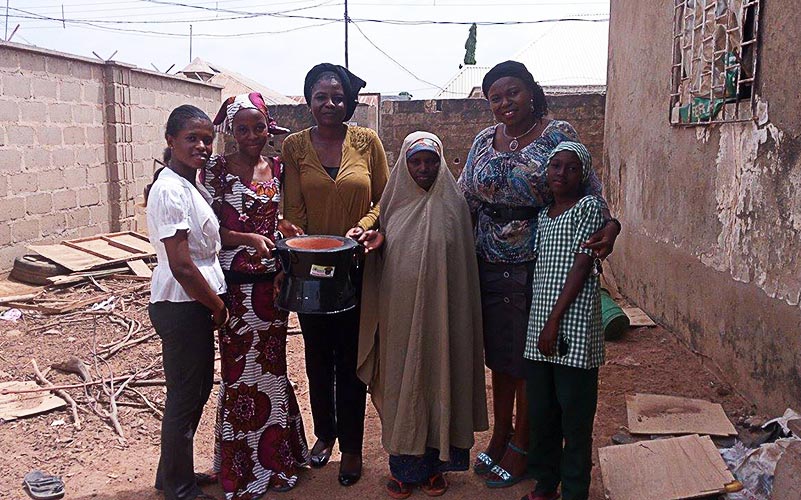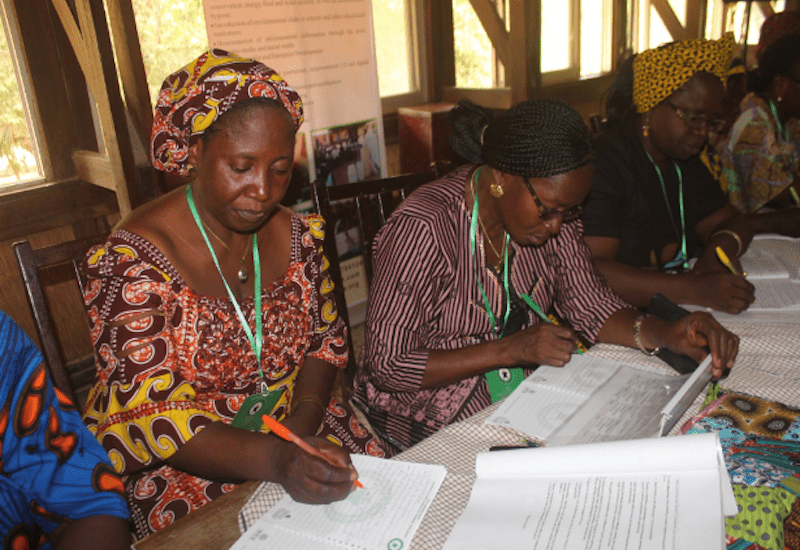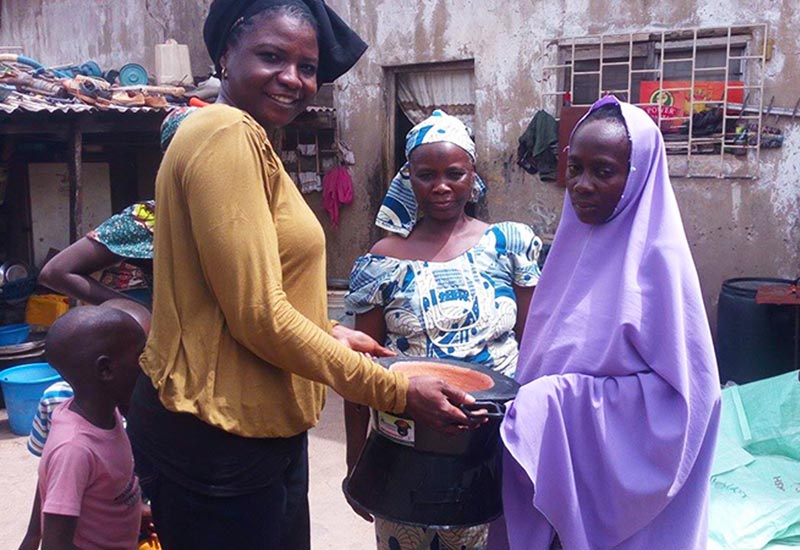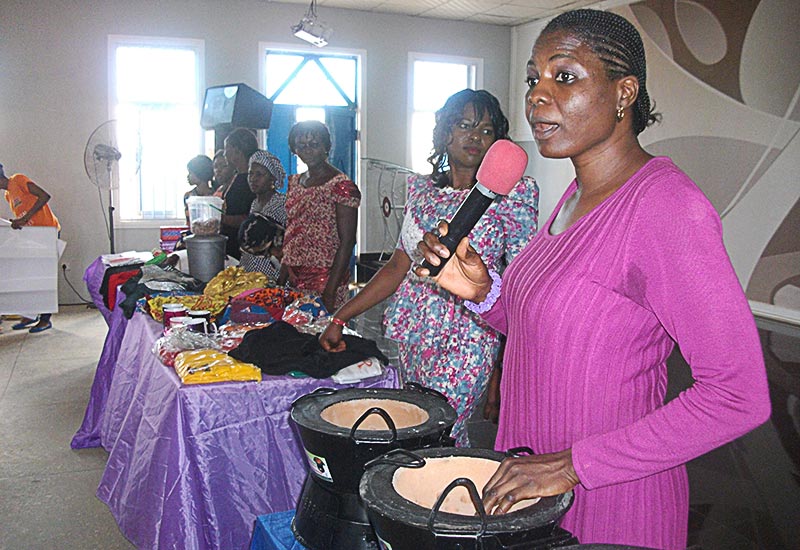Partner: WISE (Women Initiative for Sustainable Environment), based in Kaduna, Nigeria
Goal: Improve the health and safety of women, reduce deforestation and increase household savings in Kaduna State through training women entrepreneurs to build and scale clean cookstove businesses, train their families and communities to adopt cookstoves, and form networks to advocate for clean energy at the local and national levels in a region severely impacted by climate change, deforestation, and poverty, where high percentages of women are sick and die from smoke inhalation from traditional open stoves.
Impact: WEA’s Clean Energy Accelerator equipped women leaders from Northern Nigeria to launch clean cookstove enterprises that resulted in over 6,500 households purchasing clean, safe cookstoves within the first year. This translated into: 39,000 trees saved from deforestation, 16,000 tons of carbon sequestered, $550,000 of household savings, 3.4 million hours of women’s productive time diverted from firewood collection to school and livelihood activities; and 32,500 healthier people who are not at risk of toxic smoke inhalation, which is the 3rd largest killer in Nigeria after AIDS and malaria.
Meet the Women Leaders
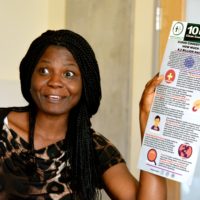
Olanike Olugboji is a WEA founding mother, who participated in WEA's first Women and Water Training in Kenya. She then returned to Nigeria and launched WISE, which today has trained over 3,000 women in clean energy, safe water technologies, and entrepreneurship.
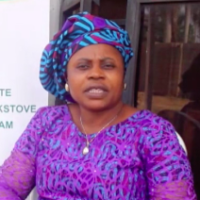
Regina Poto, financial advisor for the WISE Clean Cookstoves Training initiative, has a long tenure in the banking sector and has brought a wealth of knowledge in business plans, profitability, marketing, scalability and long-term sustainability.
At a Glance
98,000 Nigerians die annually as a result of smoke inhaled while cooking with firewood.*
72% of Nigerians depend solely on fuelwood for cooking. After malaria and HIV/AIDS, smoke is the biggest killer of mostly women and children.In addition to this health problem, traditional biomass stoves burn 90% more wood than is necessary. This has cost poor families and institutions money that could be spent on education, health, and nutrition.*
Nigeria’s fuel wood consumption is about 80 million cubic meters, making biomass fuel the most common source of household energy in Nigeria.*

“As a young child, barefoot women and girls carrying heavy containers of water on their heads, walking long distances under the searing sun were a common sight. The reality of this stayed with me, and I knew I would do something about it someday.”
— OLANIKE OLUGBOJI, WEA FOUNDING MOTHER, PROJECT LEADER

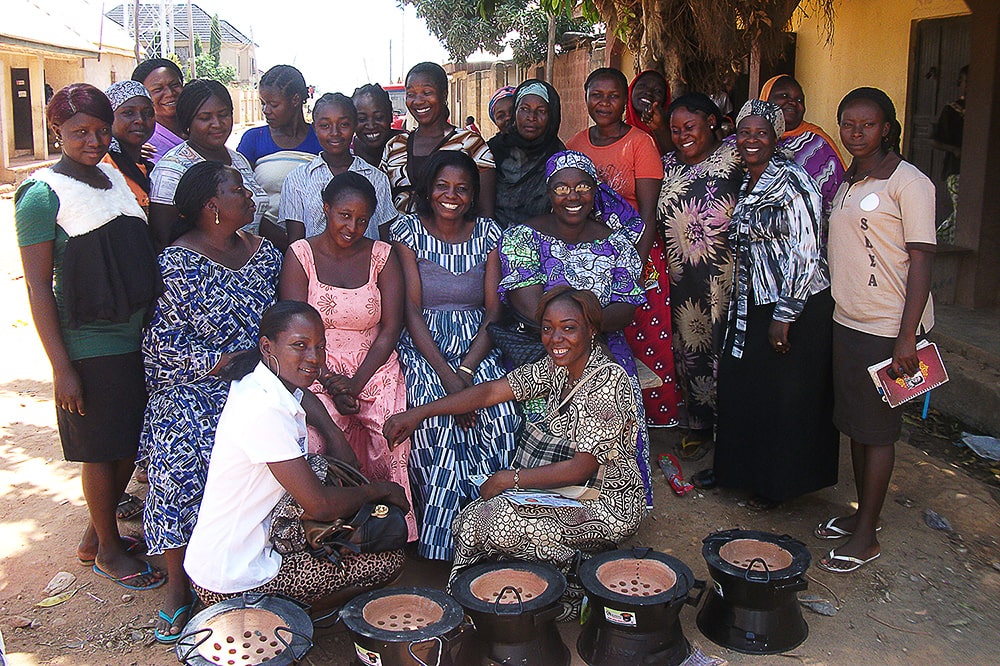
The Need
The use of open fires and traditional cookstoves is a primary global health and environmental problem, killing over 4 million people every year and sickening millions more. In many parts of sub-Saharan Africa, more than 90% of the rural population relies on fuelwood and charcoal.
The health and economic burdens of dirty cookstoves disproportionately affect women and girls, who inhale the daily equivalent of up to 20 packs of cigarettes cooking 3 meals per day and spend up to 4 hours per day (or 60 days per year) collecting firewood; this means less time to attend school or work. Traditional cooking is also expensive, costing poor families money that could be better spent on education, health, and nutrition.
In Nigeria alone:
- 72% of Nigerians depend solely on fuelwood for cooking.
- Approximately 95,000 people die annually from inhaling smoke emanating from cooking with wood. *
- Lower respiratory infections were the leading cause of death, killing 290,200 people in 2012. *
- Nigeria has the largest desertification rates in the world with loss of 55.7% of its primary forests.
- The annual rate of deforestation in Nigeria is approximately 3.5% — between 350,000 and 400,00 hectares of land annually. *
Most people are not aware of the grave health and environmental risks associated with traditional open fire cooking, or cannot afford cleaner options.
The Project
WEA and WISE are partnering on the Women’s Clean Cookstoves Project to directly equip 30 women entrepreneurs with the training, seed grants, and leadership networks to become profitable entrepreneurs and clean energy leaders in their communities. These 30 women have scaled clean cookstove sales and spawned complementary clean energy enterprises and advocacy to benefit tens of thousands more Nigerians. As a result, these families are breathing healthier air, reducing deforestation, increasing household savings, improving health and safety, and transforming their sense of personal and community empowerment. Our team achieved the following:
- Clean cookstove businesses. 30 women leaders launched and scaled cookstove enterprises in teams of 2 with the support of a two-part intensive training, seed grant funding and peer support. Trainings covered financial management strategies, profit generation, clean cookstove technologies, leadership, and entrepreneurship. The women were equipped to market stoves with strategic messaging and train their communities on the benefits and operation of the new clean stoves, and reached 13,000 people in Kaduna state within one year.
- Leadership, advocacy, and intergenerational knowledge. In order for women and their families to adopt clean cookstoves, it is critical that they understand the life-threatening importance of replacing traditional cookstoves. Through participation in community trainings, public demonstrations, networking events, and advocacy campaigns, women across generations increased their capacity and confidence to be social, ecological, and economic leaders in their families and communities for adoption of clean, safe cookstoves.
- Financing for cookstove purchasing. At an average price tag of approximately $15 per clean cookstove, even “affordable” clean cookstoves can be cost-prohibitive for low-income families in Nigeria. With lower firewood costs, these new stoves pay for themselves within 2-3 months of daily use.
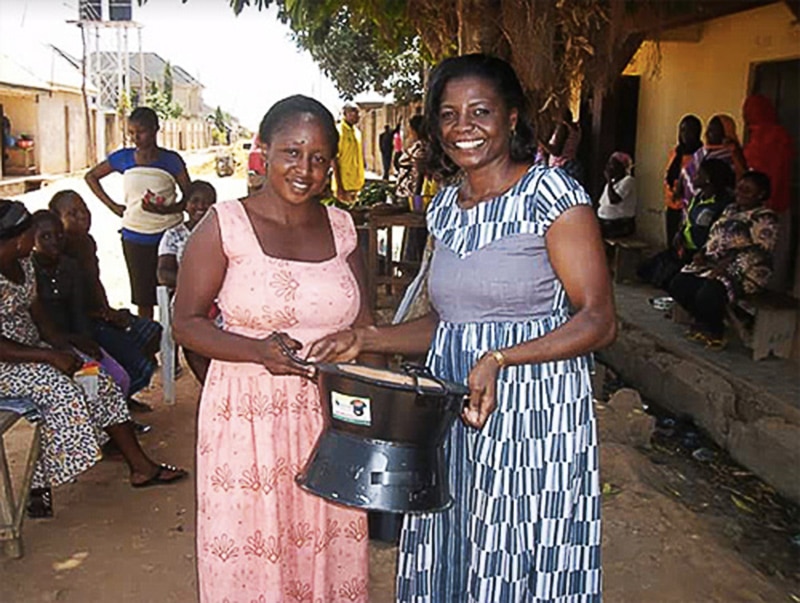
Project Update
The representative candidates for our WISE Clean Cookstove Project are women who work as leaders or members of women’s groups in their local communities. Many of our selected participants are founders of their own nonprofits that promote women’s empowerment or are involved in community mobilization and outreach.
All selected participants had income generating projects, making a maximum of $120 per month, prior to our training. Most of them had attended vocational skills training (i.e. how to make liquid soap, how to make bags, bead-making, farming, etc.).
Having such fundamental business acumen was a critical factor in our selection criteria. In fact, during the first week of training, each woman brought something that represented their income-generating activities to share with their peers.
The Participants:
- Alimat Abdulsalam: WWDSRF
- Angelina Boye: Attacker Women Association of Nigeria
- Anna Avong: Founder of ATAN
- Assibi A. Hassan:Sabon Gari Peace Women Multipurpose Cooperative Society
- Biola Kamardeen: Executive Director of Women In Need Foundation
- Bridget Joseph: President of Fembridge Development Initiative
- Elizabeth Nana Sule: Clothing Business Owner
- Elizabeth Yakubu: KURAMA Women Association
- Florence Paul: Caring Culture
- Gwamma Ango
- Hajia Binta Yahaya: Women of Vision Development Initiative
- Hajia Fatima Inuwa: Fahinta Women Multipurpose & National Council of Women Societies
- Hajia Maryam Sale: Agricultural business owner
- Hajiya Asabe Danlami: Fantsuam Foundation
- Halima Tanimu: Sabon Gari Peace Women Multipurpose Cooperative Society
- Helen Achi: Tsontat Multipurpose Cooperative Society
- Jumai Elizander: Hamda Women Organization
- Ladi Makawa Bonat: President of Women of Vision Development Initiative
- Lady Yusuf: National Council For Women Societies
- Margaret Sani: Member of FEDI
- Rahila Dominic: National Council for Women Societies
- Rifkatu Bawa: KURAMA Women Association
- Rifkatu Buba: Women Advocates Research and Documentation Center
- Risikat Muhammed: WWDSRF
- Sarah Etham: Fantsuam Foundation
- Tabitha Bako: Executive Official of the National Council for Women Societies
- Theresa M. Biniyat: Youth, Orphans and Widows Empowerment
- Victoria Danjuma: GERTI Women Association
- Victoria David Adams: Women Advocates Research and Documentation Center
- Victoria Sankwai: Youth, Orphans and Widows Empowerment


